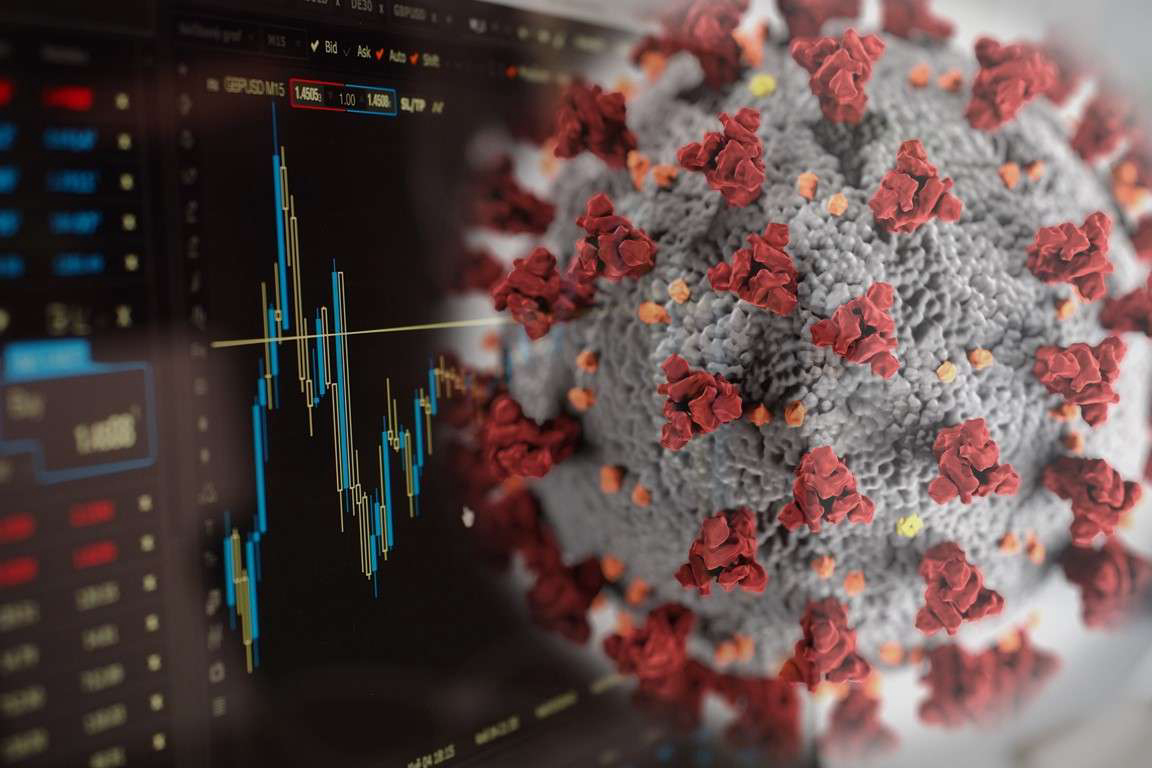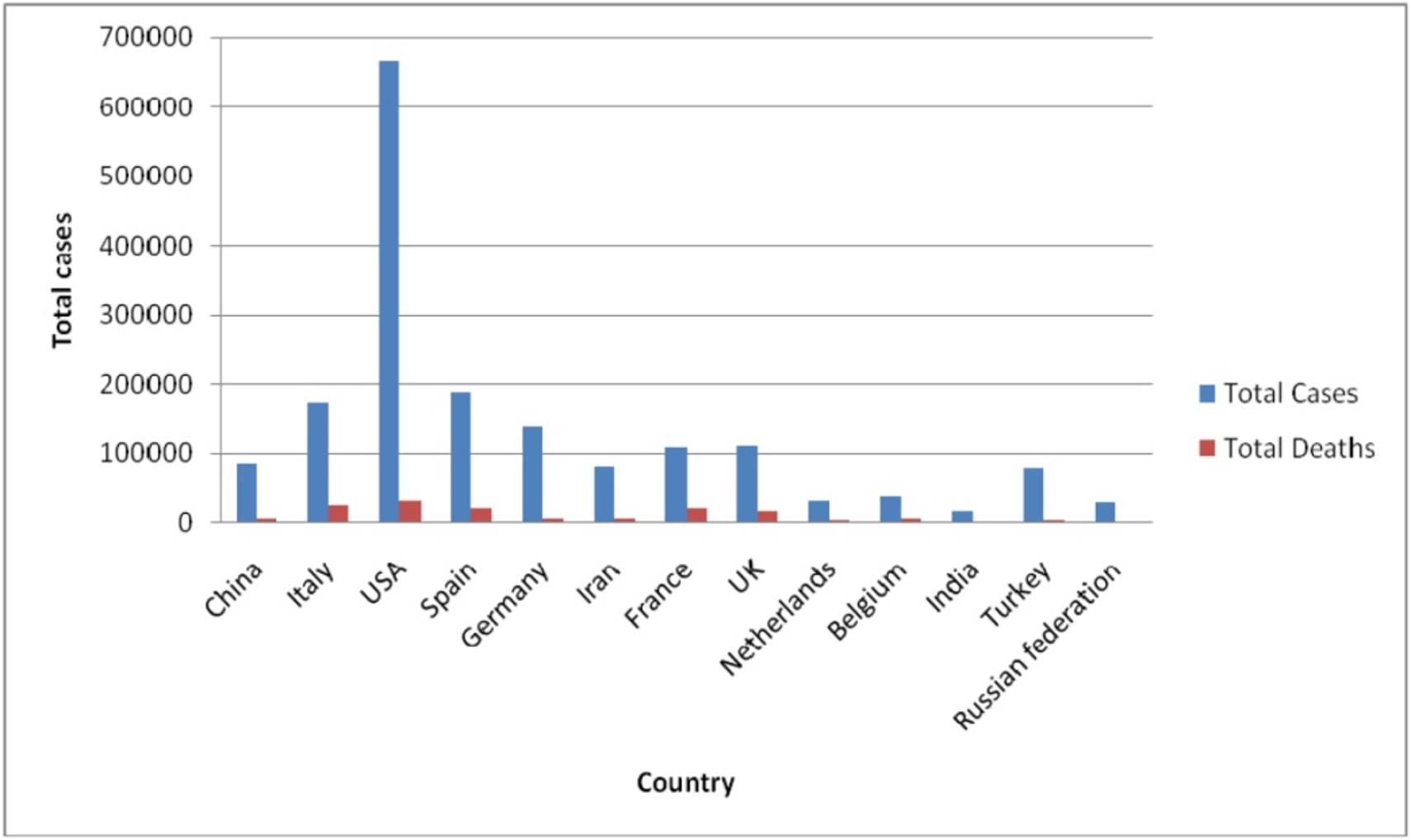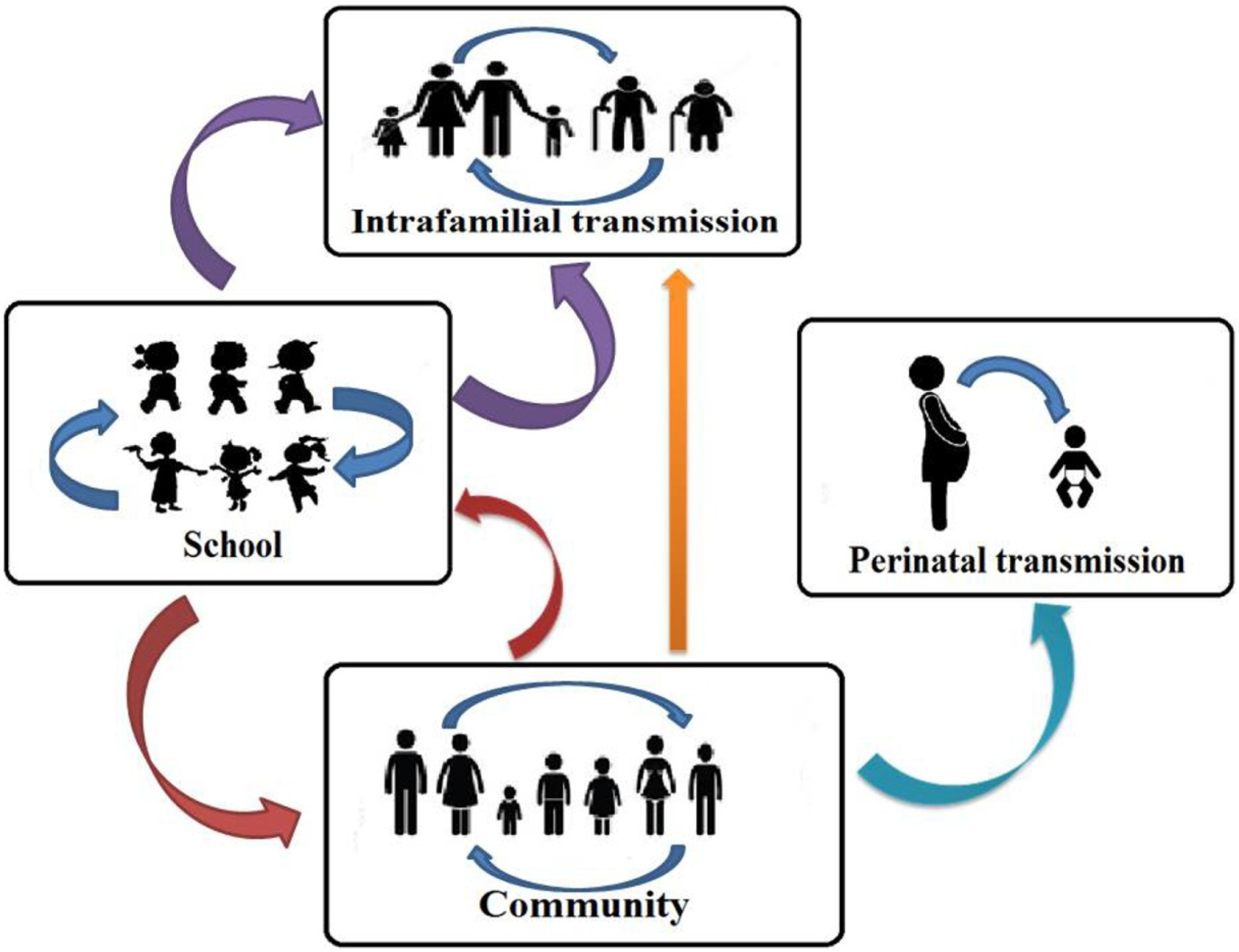
Nearly 100,000 people worldwide have been diagnosed with COVID- 19, the new coronavirus that emerged in Wuhan, China, in late 2019. The COVID-19 pandemic is considered as the most crucial global health calamity of the century and the greatest challenge that the humankind faced since the 2nd World War. It was named by the World Health Organisation as COVID-19 (coronavirus disease 2019). A new class of corona virus, known as SARS- CoV -2 (severe acute respiratory syndrome coronavirus 2) has been found to be responsible for occurrence of this disease. Till now there is no report of any clinically approved anti-viral drugs or vaccines that are effective against COVID-19. It has rapidly spread around the world, posing enormous health, economic, environmental and social challenges to the entire human population. The coronavirus outbreak is severely disrupting global economy. Almost all the nations are struggling to slow down the transmission of the disease by testing and treating patients, quarantining suspected persons through contact tracing, maintaining complete or partial lockdown, etc. This paper describes the impact of COVID-19 on economy, politics and international politics and global health and the way in which a small country, Taiwan has managed to defeat the coronavirus.
INTRODUCTION
Pandemics in general are not merely serious public health concern, rather these trigger disastrous socio-economic and political crisis in the infected countries. It is also being an indicator of inequity and deficiency of social advancement. As is implied in the name COVID-19, ‘CO’ stands for ‘corona’, ‘VI’ stands for ‘virus’ and ‘D’ stands for ‘disease’, and 19 represents the year of its occurrence. Coronavirus is a single stranded RNA virus with a diameter ranging from 80 to 120 nm. The first modern pandemic was reported in December 31, 2019, in Wuhan, Hubei province, China and most initial cases were related to source infection from a seafood wholesale market.[i] It was been categorized as a pandemic by the World Health Organisation.[ii] According to WHO, 2002-03, more than 8000 people suffered and 774 died of a coronavirus called SARS.[iii] In 2012, MERS- CoV pandemic broke out infecting more than 2494 persons and killing over 858 lives worldwide.[iv] The main focus of this paper is on impact of COVID-19 on economy, politics, international politics and global health. The most obvious economic effect of the virus is in China which from late January has implemented an extraordinary quarantine preventing work and travel.
COVID-19 AND GLOBAL HEALTH

World Health Organisation: Clinical Management of Severe Acute Respiratory Infection When Novel Coronavirus (2019-nCoV) Infection is suspected: Interim Guidance (2020)
COVID-19 is highly infectious and can be transmitted through droplets and close contact. The human to human spreading of the virus occurs due to close contact with an infected person exposed to coughing, sneezing, respiratory droplets or aerosols (Fig.2). These aerosols can penetrate the human body (respiratory system) via inhalation through nose or mouth.[v] Symptoms include fever, cough, fatigue, shortness of breath, to severe pneumonia with respiratory failure and septic shock.[vi] COVID- 19 is a major public health concern for the world’s population and is a leading cause of hospitalization and death.

Fig. 2: Transmission dynamics of SARS-CoV-2 infection in people.
ECONOMIC IMPACT
Loss of lives due to any pandemic causes definite irretrievable damage to the society. But apart from this, COVID-19 has severely demobilized the global economy. In order to restrict further transmission of the disease in community, many of the affected countries have decided to undergo complete lockdown. Due to lockdown of all domestic flights, railway service (except goods train), bus, truck and vehicles transports are suspended with special exemption to those associated with essential commodities. Entire educational, commercial, sports and spiritual institutions are closed. Industries are suffering a lot. People belonging to tourism and transportation industry are also facing utmost difficulties. Production level has gone very low. Economy of many so-called powerful countries are now facing the threat of high inflation and increasing unemployment as a result of lack of productivity and excessive expenditure for the treatment and rehabilitation of the COVID-19 victims and their families. Lockdown will directly affect the GDP of each country in the major economics. For each month, there will be an approximate loss of 2% points in annual GDP growth. The tourism sector alone faces an output decrease as high as 50% to 70%. According to World Trade Organisation and Organisation for Economic Cooperation and Development (OCED) have indicated COVID-19 pandemic as the largest threat to global economy since the financial emergency of 2008-2009.
COUNTRY WISE SPREAD AND ITS ECONOMIC IMPACT
The impact of virus did not stop in China. Japan and South Korea have reported substantial local spread of the virus. In both the countries, the virus will have major economic ramifications. Both trade extensively with China and were already suffering from China’s sharp quarantine – induced economic slowdown. The only outliner seems to be Taiwan, deeply integrated with China’s economy, yet having succeeded so far in avoiding mass outbreak. As the virus spread to Europe, the economic impact did, too. Italy, the European country with the most confirmed cases, is also one of the European country with the most confirmed cases, is also one of the European countries least able to deal with the economic fallout. Because of its large debt burden, Italy is prohibited by European union rules from running a substantial budget deficit. Meanwhile, the European Central Bank has already at its main interest rates to negative levels.
The United States has more room with which to battle the economic effects of the coronavirus, if the policy makers choose to use them. The federal Reserve has already reduced its main interest rate by 0.5 percentage points, which should encourage businesses and consumers to borrow and spend. Congress just approved additional spending, through the $8 billion package is tiny compared to the overall size of the US economy, and so will have no macro effect. If U.S. wanted to borrow it could easily do so. [vii] The coronavirus pandemic is having a “deep impact” on Indian businesses and has already caused an unprecedented collapse in economic activities over the last few weeks. Jobs are also at risk over the coming months. [viii]
POLITICAL IMPACT
Leaders from South Korean President Moon Jae-in, Japanese Prime Minister Shinzo Abe and U.S. President Donald Trump have been sharply criticized for mishandling the virus and allowing cases to increase. Speculation is growing that P.M. Abe may be forced to leave office earlier than expected, while if coronavirus causes an economic slowdown, then it could reduce the chances that President Trump is reelected. President Moon, meanwhile, faces a petition signed by hundreds of remove him from office. Taiwan seems to be the only country where the government’s approval rating has increased. In India, though there are not as high cases as in Italy or U.S. but the infrastructure is not capable to handle if the cases sour up like that in Italy. There are no enough beds in the hospitals leave alone the number of ventilators. The government has done something but not in the right direction. Just by lighting candles, or beating thalis or splashing flowers over doctors is not enough to defeat COVID-19. Some concrete steps needed to be taken. Though the government has imposed a lockdown but should have the government banned entry or quarantined the passengers coming from abroad earlier, the poor would not have suffered from the lockdown. We could have easily tackled COVID-19 just like Taiwan.
AFFECT ON INTERNATIONAL POLITICS
Relations between U.S. and China plunged to a nadir in recent weeks. On May 15, President Donald Trump threatened to “cut off the whole relationship” with China over the COVID-19 pandemic. He had earlier called coronavirus as “Chinese virus” and threatened to seek compensation from China for the damage caused by the outbreak. Earlier this month, the U.S. imposed visa restrictions on the Chinese journalists working in the country limiting their work period to 90 days. China, sometimes, through the state-run media, has hit back, calling Trump’s comments “lunacy” and Mike Pompeo, the U.S. Secretary of State, “an evil politician”. The rising tensions between the two superpowers have prompted many experts to warn of a new Cold War.[ix]
Some have argued that the U.S.’s less than satisfactory response to the pandemic and Beijing’s apparent success in battling the virus as well as its outreach to other countries may result in China gaining global pre- eminence. However, it is not only premature but also erroneous to assume that there is going to be a fundamental shift in global power relations in favour of China. In fact, the COVID -19 crisis has substantially dented China’s image globally.[x]
HOW EUROPE DEALT WITH CORONAVIRUS?
Several European countries announced their first coronavirus cases, all apparently linked to the growing outbreak in Italy, Austria, Croatia, Greece and Switzerland said the cases involved people who had been to Italy. Italy has in recent days become Europe’s worst affected country. The members of European Union are taking similar- but different- courses of action to fight the spread of coronavirus. Some member states are reintroducing border controls or even closing border for non- nationals. The European Union considered banning all but essential foreign travel to the bloc for 30 days. On 8 March, the northern region of Lombardy and 14 other provinces were shut down, leaving 16 million people quarantined. The next day that lockdown was extended to cover the whole country.
12 March- Ireland closed schools and cancelled planned St. Patrick’s Day parades
15 March- the Netherlands announced the closure of all its schools.
16 March- Iceland banned all gatherings of more than 100 people.
17 March- France announced a nationwide lockdown.
Spain, another nation suffering high rates of infection and fatality, instigated a series of lockdown. Germany has a population of 83.7 million and has conducted the most tests- more than 2 million.
FACTORS THAT HELPED IN THE CONTAINMENT OF COVID-19
Quality of health- countries that have successfully managed the outbreak tend to be healthier than those that have not. Researches think obesity and heart disease are among the greatest risk factors for COVID-19 mortality.
Quality of public health system- the strength of a country’s public health system on day one is a huge determinant of how well it can handle a pandemic. Countries that plan for and invest in preparedness fare better than those who do not.
Culture and social cohesion- societies that elevate the good of the whole over the preferences of individual tend to have a greater degree of social cohesion and compliance with rules designed to protest the public in a health crisis.
Critical decision making- one lesson from pandemic “war game” exercises is the importance of acting early and decisively to slow the spread of infection.
Considering the entire country- countries that have applied policies nationwide or thought through the implications that regional policies could have done better than those that have not done so. Germany was the only country in Europe with uniform practices nationwide from the start. It has among the fewest cases and deaths per capita in Europe.
Leadership- New Zealand’s Prime Minister Jacinda Arden has been praised for her empathy and clear, fact-based communications. South Korean President Moon Jae-in’s party recently won a landslide victory in parliamentary elections due in part to public perceptions of his competence in handling the COVID-19 crisis and in rapidly providing emergency economic relief to citizens.
TAIWAN'S STRATEGY
In the 17 years since it was hit hard by the SARS outbreak, Taiwan has been in a state of constant readiness to the threat of emerging infectious disease. As a result, when information concerning a novel pneumonia outbreak was first confirmed on December 31, 2019, Taiwan began implementing onboard quarantine of direct flights from Wuhan that same day. On January 2, 2020, Taiwan established a response team for the disease and activated the Central Epidemic Command Centre (CECC) on January 20 as a level 3 government entity, upgrading it to level 2 and level 1 on January 23 and February 27, respectively. The CECC is able to effectively integrate resources from various ministries and invest itself fully in the containment of the epidemic.
CONCLUSION
COVID -19 is one of the deadliest virus the world has ever seen. It has impacted destructively on economy of the infected countries. But if it is able to shift the power centre in international politics is further to come. In conclusion, we can say that by giving up our ego and hatred towards each other and by helping everyone whole heartedly and coming together as one, we can defeat coronavirus easily. COVID-19 had many negative effects, it has also helped to make our environment more clean and green. For instance, several plans were made and crores of money was spent in cleaning Ganga since years but within 15 days of the lockdown Ganga got purified itself. Global preparedness for pandemics requires cooperation among governments, laboratories, doctors and nurses, civil society, aid organizations and the industries that produce life- saving vaccines and medicines. In order to know what dangers exist and for scientists and industries to be able to produce effective medicines and vaccines or medicines to counter them. At the same time, a global system is needed to ensure that access to vaccines or medicines during a pandemic is not based on equity: rich and poor alike should have access at the same time to life- saving products when they become available.
[i] C. Huang, Y. Wang, X. Li, L. Ren, J. Zhao, Y. Hu, et al.; Clinical features of patients infected with 2019 novel coronavirus in Wuhan, China; Lancet, 395 (2020), pp. 497-506, 10.1016/ S0140-6736(20) 30183-5
[ii] World Health Organisation; Clinical Management of Severe Acute Respiratory Infection When Novel Coronavirus (2019-nCoV) Infection is suspected: Interim Guidance (2020)
[iii] World Health Organisation; Summary of propable SARS cases with onset of illness from 1 November 2002 to 31 July 2003; https://www.who.int/csr/sars/country/table2004_04_21/en/ (2004), Accessed 19th May 2020
[iv] World Health Organisation; Middle East Respiratory Syndrome Coronavirus (MERSCoV); http://www.who.int/emergencies/merscov/en (2013), Accessed 19th May 2020
[v] Phan et a., 2020; L.T. Phan , T.V. Nguyen, Q.C. Luong,, H.T. Nguyen, H.Q. Le et al.; Importation and human- to- human transmission of a novel coronavirus in Vietnam; N. Engl. J. Med., 382 (9) (2020), pp. 872-874, 10.1056/NEJMc2001272
[vi] J.A. Backer, D. Klinkenberg, j. Wallinga; Incubation period of 2019 novel coronavirus (2019-nCoV) infections among travelers from Wuhan, China, 20-28 January 2020; Euro Surveill, 25 (5) (2020), pp. 1-6, 10.2807/1560-7917.ES.2020.25.5.20 0 0 062
[vii] COVID-19 Crisis: political and economic aftershocks; Chris Miller; https://www.fpri.org/article/2020/03/covid-19-crisis-political-and-economic-aftershocks/ (2020), Accessed 21th May 2020
[viii] Economy suffers ‘unprecedented collapse’ due to COVID-19:Survey; https://economictimes.indiatimes.com/news/economy/finance/economy-suffers-unprecedented-collapse-due-to-covid-19-survey/articleshow/75276117.cms (2020), Accessed 21th May 2020
[ix] Analysis| Are the U.S. and China entering a new Cold War?; https://www.thehindu.com/news/international/analysis-are-the-us-and-china-entering-a-new-cold-war/article31615458.ece (2020), Accessed 23th May 2020
[x] Taiwan’s coronavirus protocol tells how it is done; https://www.thehindu.com/opinion/op-ed/taiwans-coronavirus-protocol-shows-how-it-is-done/article31484681.ece (2020), Accessed 24th May 2020
